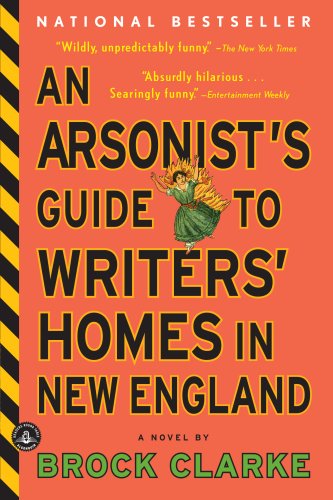 An Arsonist's Guide to Writers' Homes in New England
An Arsonist's Guide to Writers' Homes in New England(2007)
Written by Brock Clarke
I read the reviews included in this book, and I can't help but feel that I missed something. The included reviews are absolutely glowing. They all seem to have loved this book. I, uh, I don't understand. The Pittsburgh Post-Gazette recommends the book "to anyone, and especially anyone who wants to read the best, newest manifestation of great American writing." ...right. Listen, people, I've read Mark Twain, which I think we can all agree was one of the first manifestations of great American writing, and, let me tell you, Brock Clarke is no Mark Twain.
There are a lot of things wrong with this book. For one thing, I found the main character, Sam, to be absolutely infuriating. He gets himself into a tough spot by lying, which, we can admit, happens at one point or another to everybody. I, for example, have a single customer at work who thinks I have a very thick Australian accent, and he shows up once every week or two. When I see him, I panic, and go back into the accent, rather than explaining to him that I had an Australian friend over that week, and had picked it up from her. Anyway, Sam, the protagonist, gets himself into a complicated situation by lying, and, when confronted with an opportunity for an out, he lies some more. I almost stopped reading there, on page 25, but I have a bit of a quota to maintain, so I persisted in going on.
I have to compliment Clarke on his ambition; he attempts in the course of these undercooked 300 pages to tackle just about every major emotional truth in existence. And some of them are very well conceived; to quote my own lyrics, may I be so bold, the concept is good, but the execution is off. A number of these moments happen, and are then followed by Sam, in first-person narrative, saying, "It was then that I realized...," and explaining the moral of that little story. It's somewhat akin to the way Stan and Kyle used to end each episode of South Park, only without the knowing wink and smattering of self-awareness. He either didn't trust the audience to think for themselves, or he's a lazy writer... the former makes him pretentious, and the latter makes him, well, lazy, and I'm not sure which is worse. With a little more showing, as opposed to telling, this book could have been twenty-to-thirty pages shorter, and a lot stronger.
It is meant to be an absurd book, with characters that are outlandish, but even outlandish characters have to hit the right mark, and Clarke fails on that level. It is, ultimately, an entertaining read, if you can get past the fact that you don't really care about what's happening, that the characters could never exist in real life (in the bad way), and that what you're reading could have been written by a high school student. I know, I'm a snob, but it only has 2.5 stars on Amazon, so I can't be the only one.
Kudos, though, for the idea: "I went to jail for accidentally burning down Emily Dickenson's house, and two people died in the fire because they sneaked in to have sex in her bed" is one of the best concepts for a crime I've ever heard. A shame it was wasted here.
Grade: C-

1 comment:
That's too bad. I was pulling for this book to be a good one when you told me about it. Was this their first book?
I'm about to start the Joy Luck Club-- after Admission (blah) and Sabbath's Theater (fantastic but who cares) -- a total of 900 pages-- I'm in need of something to blow my socks off.
Post a Comment